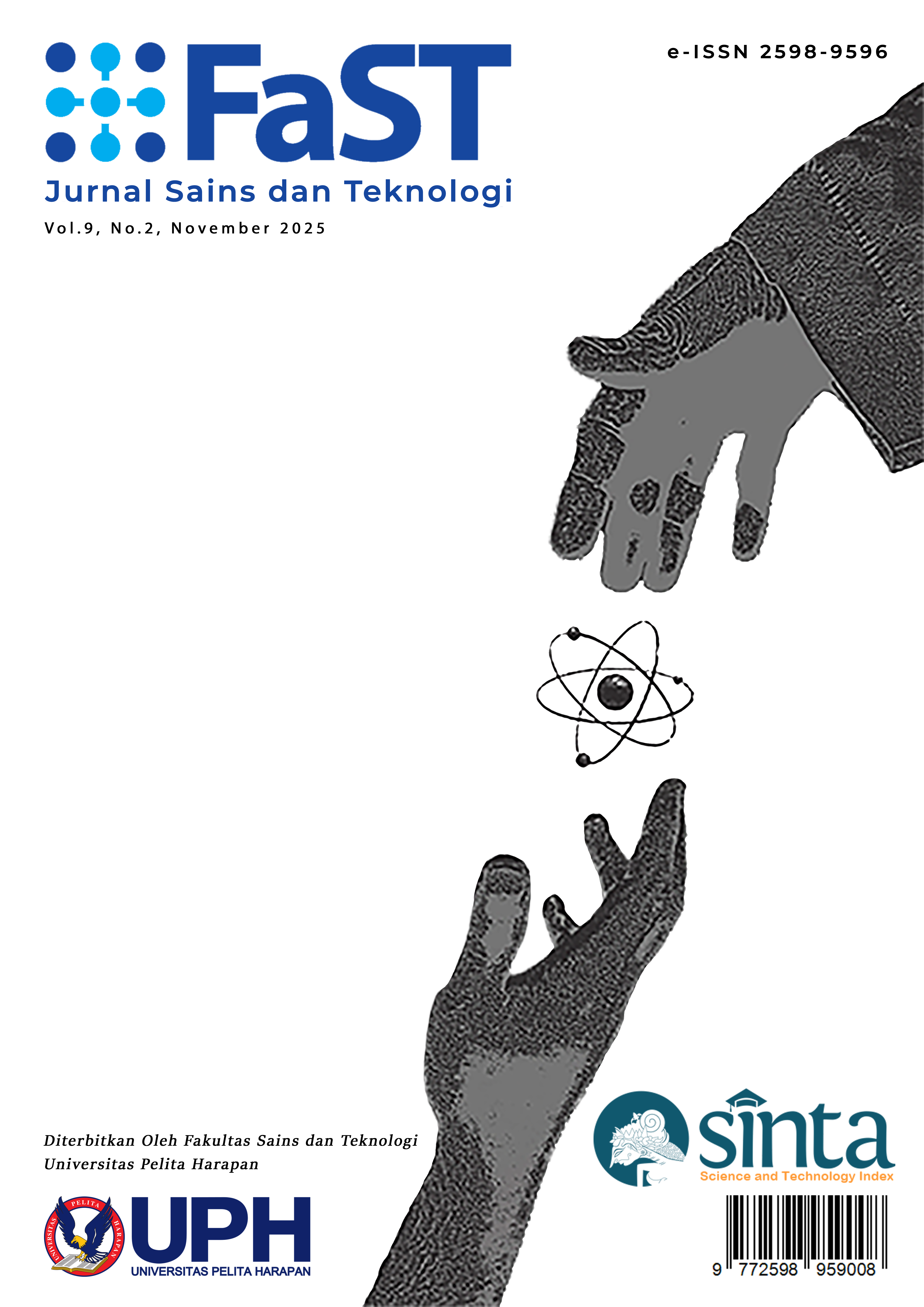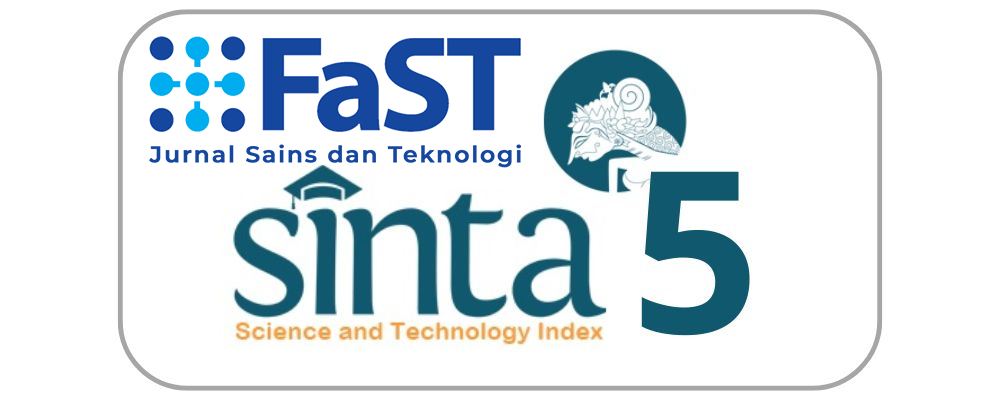Karakteristik Fermentasi Kitin dari Kulit Udang Windu (Penaeus monodon) dengan Kapang Trichoderma virens
[Characteristics of Chitin Fermentation from Black Tiger Shrimp (Penaeus monodon) using Trichoderma virens]
DOI:
https://doi.org/10.19166/jstfast.v9i2.10371Abstract
Black tiger shrimp (Penaeus monodon) is the most widely used shrimp in fisheries industries of Indonesia for export. This activity contribut to increase the amount of shrimp shell waste. Shrimp shell contains chitin at 15-20%. Chitin can be hydrolyzed using chitinase to produce N-acetylglucosamine. This research was conducted to determine profile of chitin fermentation yield from black tiger shrimp shell (Penaeus monodon) using Trichoderma virens. Chitin was made by demineralization and deproteination black tiger shrimp shell waste. The production of fermentation yield was using solid substrate fermentation. Duration of fermentation process was 8 days, incubation temperature was 30 oC and pH 4. Based on the results of fourier transform infrared (FT-IR) spectrophotometer and liquid chromatography-mass spectrometry (LC-MS) analysis, it can be seen that crude N-acetylglucosamine oligosaccharides can be produced as the result of chitin fermentation besides N-acetylglucosamine. It can be determined from the presence of C-O-C groups and the molecular weight (10949,6230) which is a derivative molecule of GlcNAc-2-Man-3-GlcNAc-Fuc-GlcNAc and can be classified as N-gylcans.
Bahasa Indonesia Abstract: Udang windu (Penaeus monodon) merupakan jenis udang yang paling banyak diekspor oleh negara Indonesia. Kegiatan ini berkontribusi dalam peningkatan jumlah limbah kulit udang. Di dalam kulit udang, terkandung 15-20% kitin. Kitin dapat dihidrolisis menggunakan enzim kitinase untuk menghasilkan N-asetilglukosamin. Penelitian ini bertujuan mengetahui profil hasil fermentasi kitin dari kulit udang windu (Penaeus monodon) dengan kapang Trichoderma virens. Kitin dibuat dengan proses demineralisasi dan deproteinasi limbah kulit udang windu. Proses produksi hasil fermentasi kitin menggunakan proses fermentasi substrat padat. Proses fermentasi dilakukan selama 8 hari dengan suhu inkubasi 30 oC, and pH 4. Berdasarkan hasil analisis fourier transform infrared (FT-IR) spectrophotometer dan liquid chromatography-mass spectrometry (LC-MS) dapat diketahui bahwa selain dihasilkan N-asetilglukosamin dapat dihasilkan crude oligo N-asetilglukosamin merupakan hasil fermentasi kitin. Hal tersebut dapat diketahui dari adanya gugus C-O-C dan berat molekul (1094,6230) yang merupakan molekul turunan GlcNAc-2-Man-3-GlcNAc-Fuc-GlcNAc dan dapat digolongkan sebagai N-glikan.
References
Agustina, S., Swantara, I. M. D., dan Suartha, I. N. 2015. Isolasi kitin, karakterisasi, dan sintesis kitosan dari kulit udang. Jurnal Kimia 9 (2): 271-278.
Ahing, F.A. dan Newati Wid. (2016) Extraction and Characterization of Chitosan from Shrimp Shell Waste in Sabah. Transactions on Science and Technology, 3 (1-2): 227-237.
Arif, A.R., Ischaidar, Natsir, Hasnah., Dali, Seniwati (2013) Isolasi kitin dari limbah udang putih (Penaeus merguiensis) secara enzimatis. Seminar Nasional Kimia: Peran Sains dan Teknologi Dalam mendukung Ketahanan Pangan dan Energi Nasional. Universitas Hasanuddin, Makassar: 10-16.
Aziz, Suraini Abd., Teoh Lay Sin, Noorjahan Alitheen, Neelam Shahab, dan Kamarulzaman Kamaruddin. 2008. Microbial Degradation of Chitin Materials by Trichoderma virens UKM1. Journal of Biological Sciences 8 (1): 52-59. https://doi.org/10.3923/jbs.2008.52.59
Czechowska-Biskup, R., Jarosisńska, U., Rokita. B., Ulański, P., Rosiak. J. M. (2012) Determination of degree of deacetylation of chitosan- comparison of methods. Progress on Chemistry and Application of Chitin. Volume XVII, 2012. Lodz University of Technology, Poland.
Dahiya, N., R. Tewari, R.P. Tiwari dan G.S. Hoondal. (2005) Chitinase from Enterobacter sp. NRG4: Its purification, characterization and reaction pattern. Eur. J. Biotechnol., 8 (2): 134-145. https://doi.org/10.2225/vol8-issue2-fulltext-6
Duarte, M., Ferreira, M., Marväo, M., Rocha, J. (2002) An optimized method to determine the degree of acetylation of chitin and chitosan by FTIR spectroscopy. Int J Biol Macromol 31: 1–8. https://doi.org/10.1016/S0141-8130(02)00039-9
Hargono, Abdullah, dan Sumantri I. (2008) Pembuatan kitosan dari limbah cankang udang serta aplikasinya dalam mereduksi kolesterol lemak kambing Reaktor 12(1):53-57. https://doi.org/10.14710/reaktor.12.1.53-57
Herdyastuti, N., Raharjo, T.J., Mudasir, dan Matsjeh, S. (2009) Kitinase dan Mikroorganisme kitinolitik: Isolasi, Karakterisasi, dan Manfaatnya. Yogyakarta: Department of Chemistry, Gadjah Mada University. https://doi.org/10.22146/ijc.21580
Hossain, M. S., dan Iqbal, A. (2014) “Production and Characterization of Chitosan from Shrimp Waste”. Bangladesh Agricultural University, India. J. Bangladesh Agril. Univ. 12 (1): 153-160, 2014. ISSN 1810-3030. https://doi.org/10.3329/jbau.v12i1.21405
Kementerian Kelautan dan Perikanan. 2016. MEA Centre. Sektor Kelautan dan Perikanan. KKP.
Kova´cs, A., Bala´zs Nyerges, dan Vladislav Izvekov. (2008) Vibrational analysis of N-Acetyl-Alpha-D-glucosamine and Beta-D-Glucuronic Acid. J. Phys. Chem. B 112: 5728-5735. https://doi.org/10.1021/jp710432d
Krokeide, I. M., Synstad, B., Gaseidnes, S., Horn, S. J., Eijsink, V. G., dan Sorlie. (2007) Natural substrate assay for chitinases using high-performance liquid chromatography: A comparison with existing assays. Anal Biochem 363: 128-134. https://doi.org/10.1016/j.ab.2006.12.044
Lv, Y.M., P. Laborda, K. Huang, Z.P. Cai, M. Wang, A.M. Lu, C. Doherty, L. Liu, S.L. Flitsch, dan J. Voglmeir. (2017) Highly efficient and selective biocatalytic production of glucosamine from chitin. Green Chem 19: 527-535. https://doi.org/10.1039/C6GC02910H
Puspawati, N.M., dan Simpen, I.N. (2010) Optimasi deasetilasi kitin dari kulit udang dan cangkang kepiting limbah restoran seafood menjadi kitosan melalui variasi konsentrasi NaOH. Universitas Udayana, Bukit Jimbaran. Jurnal Kimia 4 (1), Januari 2010: 79-90.
Sashiwa, H., Fujishima, S., Yamano N., Kawasaki N., Nakayama A., Muraki E., Hiraga K., Sukwattanasinitt M., Pickyangkura R., and Aiba S. (2003) Enzymatic production of N-acetyl-D glucosamine from chitin. Carbihydrate Polymers Elsevier 51 (4): 391-395. https://doi.org/10.1016/S0144-8617(02)00192-3
Wahyuni, Ahmad Ridhay, dan Nurakhirawati. (2016) Pengaruh waktu proses deasetilasi kitin dari cangkang bekicot (Achatina fulica) terhadap derajat deasetilasi. Kovalen 2 (1): 1-7. 10.22487/j24775398.2016.v2.i1.6039
Wang, S. L., Lin, H. T., Liang, T. W., Chen, Y. J., dan Yen, Y. H. (2006) Bioconversion of shellfish chitin wastes for the production of Bacillus subtilis W-118 chitinase. Carbohydrate Res., 341: 2507-2515. https://doi.org/10.1016/j.carres.2006.06.027
Wang, S. L., Lin, H. T., Liang, T. W., Chen, Y. J., Yen, Y. H., & Guo, S. P. 2008. Reclamation of chitinous materials by bromelain for the preparation of antitumor and antifungal materials. Bioresource Technology 99: 4386–4393. https://doi.org/10.1016/j.biortech.2007.08.035
Downloads
Published
Issue
Section
License
Copyright (c) 2025 Ratna Handayani, Gerardo Kevin Liguna

This work is licensed under a Creative Commons Attribution-ShareAlike 4.0 International License.
“Authors who publish with this journal agree to the following terms:
1) Authors retain copyright and grant the journal right of first publication with the work simultaneously licensed under a Creative Commons Attribution License (CC-BY-SA 4.0) that allows others to share the work with an acknowledgement of the work's authorship and initial publication in this journal.
2) Authors are able to enter into separate, additional contractual arrangements for the non-exclusive distribution of the journal's published version of the work (e.g., post it to an institutional repository or publish it in a book), with an acknowledgement of its initial publication in this journal.
3) Authors are permitted and encouraged to post their work online (e.g., in institutional repositories or on their website). The final published PDF should be used and bibliographic details that credit the publication in this journal should be included.”





